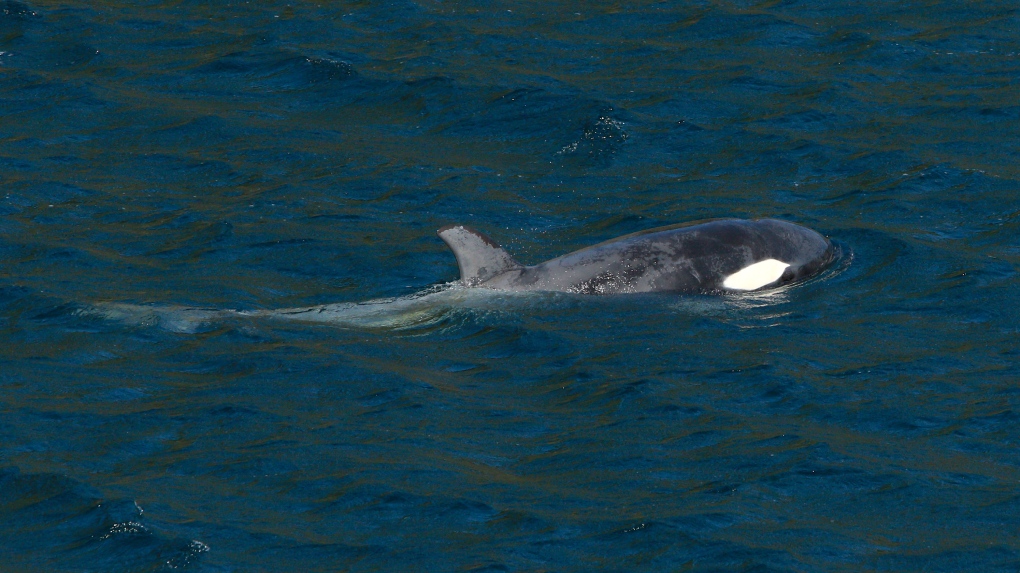Bigger boats, more nets, people arrive in Zeballos, B.C., for new orca rescue attempt
 A two-year-old female orca calf continues to live in a lagoon near an area where her pregnant mother died over three weeks ago at Zeballos, B.C., on Wednesday, April 17, 2024. THE CANADIAN PRESS/Chad Hipolito
A two-year-old female orca calf continues to live in a lagoon near an area where her pregnant mother died over three weeks ago at Zeballos, B.C., on Wednesday, April 17, 2024. THE CANADIAN PRESS/Chad Hipolito
A large seine fishing vessel capable of casting a net strong enough to hold a nearly 700-kilogram killer whale calf has arrived in Zeballos, B.C., to participate in the latest attempt to rescue the young orca stranded in a remote tidal lagoon.
The flat-bottom aluminum vessel has a built-in crane-like device for lifting heavy nets, and it's expected to be deployed as part of a rescue effort that could happen any day now in the lagoon on the northwest coast of Vancouver Island.
The female calf has been stranded alone for nearly a month since its pregnant mother died after becoming trapped on a beach at low tide.
An unsuccessful rescue attempt last Friday involved a team of more than 50 people who failed to corral the calf into a shallow area of the lagoon, where the plan was to manoeuvre the whale into a sling, lift it onto a truck, then take it on a barge out to sea, for a potential reunion with its pod.
Ehattesaht First Nation Chief Simon John says the next attempt to rescue the calf - which the nation has named the young orca kwiisahi?is, or Brave Little Hunter - will “happen eventually.”
Additional equipment and resources, including marine experts from the Vancouver Aquarium, the federal Fisheries Department and Indigenous nations, have gathered again in Zeballos for the second planned rescue attempt in just over a week.
This report by The Canadian Press was first published April 19, 2024.
CTVNews.ca Top Stories

AS IT HAPPENED Wildfire reaches Jasper Wednesday night, causes 'significant loss'
One of two wildfires threatening Jasper National Park reached the townsite Wednesday night and caused 'significant loss.'
Alberta calls in army to assist with wildfire situation
Alberta has called in the Canadian Armed Forces to help assist with the worsening wildfire situation in the province.
Biden explains why he ended re-election bid in Oval Office address
U.S. President Joe Biden on Wednesday delivered a solemn call to voters to defend the country's democracy as he laid out in an Oval Office address his decision to drop his bid for reelection and throw his support behind Vice President Kamala Harris.
Barrie-Innisfil MPP 'blacked-out' and crashed car into window of child care centre
Staff at a Barrie child care centre say they are frustrated by what they call a local MPP's inadequate response after a car crashed through a window in one of the toddler rooms.
Norad intercepts Russian and Chinese bombers operating together near Alaska in apparent first
The North American Aerospace Defence Command (Norad) intercepted two Russian and two Chinese bombers flying near Alaska Wednesday in what appears to be the first time the two countries have been intercepted while operating together.
2 Canadians being 'sent home immediately,' removed from Olympic team after drone incident
An analyst and an assistant coach with Canada Soccer are being removed from the Canadian Olympic Team and 'sent home immediately,' according to the Canadian Olympic Committee.
An unwelcome attendee has joined the Paris Olympic Games: COVID-19
After a handful of Australian water polo players tested positive for COVID-19 this week, questions have emerged around how the spread of the disease will be mitigated at the Summer Olympic Games in Paris.
Vacations, meals, booze: Contractor used $100K of charity's money for personal expenses, B.C. court finds
A B.C. man who was hired to help a non-profit build a food hub but instead spent the money on personal expenses – including travel, restaurants, booze and cannabis – has been ordered to pay more than $120,000 in damages.
Male, female killed, 2 others injured in 'gun battle' outside Toronto plaza: police
Two people are dead and two others suffered serious injuries following a shooting that police have described as a 'gun battle' outside a plaza in Scarborough, Ont. early Wednesday morning.






























